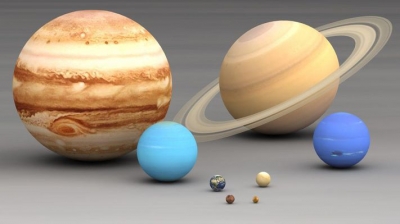
Earth is the fourth smallest of the planets—though in terms of the rocky planets, it’s the largest—but it’s the most dense. Jupiter is the largest planet in the solar system, but it’s Saturn—the solar system’s second largest planet—that takes the prize for least dense. It’s less dense than water, which has led many people to postulate that it would float. However, even if it somehow found its way to a body of water large and deep enough to contain it, Saturn would break apart and its rocky core would sink.
A planet’s density tells astronomers important things about its inner structure. For example, Mercury is almost as dense as Earth, even though it’s much smaller. Since a small planet experiences less gravitational compression than a larger planet—that is, the effects of gravity don’t squish it down as much—astronomers need to look for another reason for its density. That’s why they believe that it has a large, iron-rich core. Uranus, on the other hand, is the second-least dense of the gas giants, right behind Saturn. Like Saturn, it has a gaseous outer layer and rocky core, but where it differs is in an icy mantle between those layers made up of water, ammonia, and methane.
Picture Credit : Google




